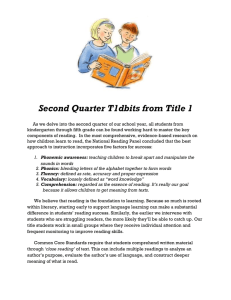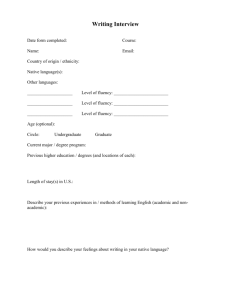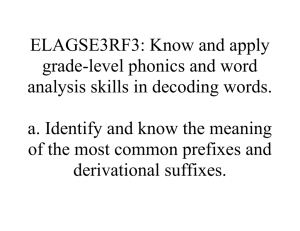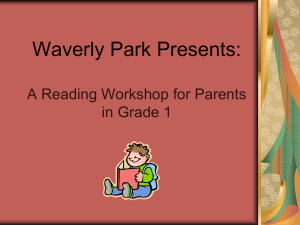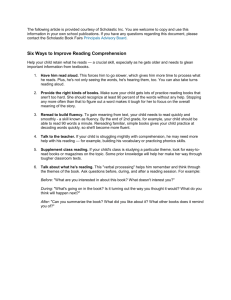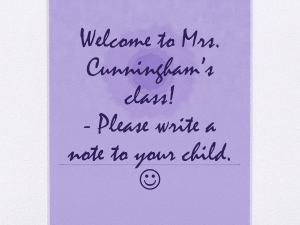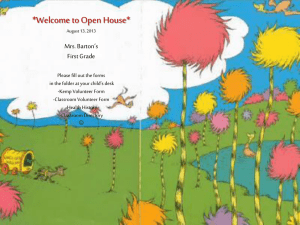File - Logans Learners 6th Grade
advertisement
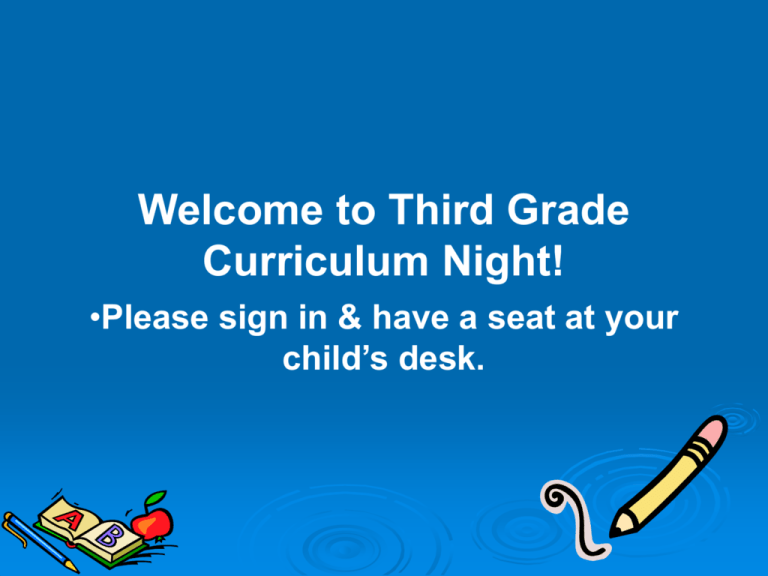
Welcome to Third Grade Curriculum Night! •Please sign in & have a seat at your child’s desk. Welcome to Curriculum Night! West Wing School August 23, 2012 Introductions Third Grade Team Mrs. Amarillas Mrs. Bohlman Mrs. Logan Mrs. Patti Mrs. VandeBerg Tonight’s Curriculum Overview I. II. III. III. IV. Reading Math Writing Science & Social Studies Spelling Reading Assessment DIBELS Dynamic Indicators of Basic Early Literacy Skills One Minute Measures of Child’s Literacy Development Assesses 3rd Graders in the area of Oral Reading Fluency (ORF) & Comprehension (DAZE) Monitors Growth Throughout the Year • Assessed Three Times Per Year Core Reading Program Reading Street Common Core Series Audio CDs Leveled Readers Below Level, On Level, Advanced, & ELL Decodable Books Student Text Books – Weekly Story, Reading Strategies & Skills ~ Both Fiction & NonFiction Small Group Practice Phonics Phonics & Word Recognition Know & apply grade level phonics & word analysis skills in decoding words. • Identify & know the meaning of the most common prefixes & derivational suffixes. • Decode words with common Latin suffixes. • Decode multi-syllabic words. • Read grade appropriate irregular appropriate words. Reading Expectations 3rd Grade ~ Strategies & Skills • • Strategies include: Background Knowledge, Important Ideas, Inferring, Monitor & Clarify, Predict & Set Purpose, Questioning, Story Structure, Summarize, Text Structure, & Visualizing. Skills include: Author’s Purpose, Cause & Effect, Classify & Catgorize, Compare & Contrast, Draw Conclusions, Fact & Opinion, Generalizations, Main Idea & Details, Graphic Sources, Literary Elements, Sequencing, & Steps in a Process Ways To Improve Comprehension Use Cues Prior to Reading: Set a purpose for reading Discuss New Vocabulary Taking a Picture Walk Making Predictions Building Background if necessary During Reading • Ask all levels of questions After Reading * Retell Story & Discuss Main Idea & Characters Ways to Improve Comprehension. Continued Comprehension can be improved by building fluency. Fluency is gained by repeated oral readings. Over the course of the week- Reread the same story several times. Vocabulary Helps children understand what they read Use context clues to decode new words Vocabulary words are correlated to the weekly story and supplemental texts Flex Reading Groups *Students switch classrooms for 30 minutes per day for specific reading instruction based on independent needs. *Within each group, students will work on one of the 5 areas of comprehension: Making Connections & Predicting, Questioning, Monitoring, Summarizing, and Visualizing. Students will switch groups throughout the year. *Students will not receive grades from their Flex Group teacher. Why Can’t My Child Skip the 20 minutes of reading each night? Student A practices 10 whole school days in a year. Student B practices 2 whole school days a year. By the end of 6th grade, if both students maintain these reading habits... Student A will have read an equivalent of 60 whole school days. Student B will have read an equivalent of 12 whole school days. Based on these habits and statistics, one can expect the gap of information to have widened considerably. How do you think both Student A and Student B will feel about him/herself as a student by the end of 6th grade? Writing & Grammar Prewrite, Draft, Revise, Edit & Publish Goals – Expressive Writing: Personal narratives, Stories Expository: journals, making lists Functional: Rules, Letters, Notes Persuasive: Support your Point of View Six Traits of Writing Organization – formats (friendly letter), transitional words (next, then, but, etc.) Voice – Demonstrate a personal touch through word choice, style & expression. Word Choice – use a variety, conveys meaning Sentence Fluency – flows & sounds like natural speech. Conventions – capital letters & punctuation. Ideas – brainstorming, staying on topic Math enVision Math from Scott-Foresman Based on Common Core Standards Research Based Incorporates Manipulatives Number Facts Assessment at the end of each topic Rocket Math for fluency in addition, subtraction & multiplication facts. Math Number Sense & Operations – Identifying numbers & relationships, Addition, Subtraction, Multiplication Estimation Data analysis, probability, discrete math – data, graphs, outcomes of experiments, counting possible outcomes Patterns Geometry Structure & Logic - Reasoning Science Foss Science Active & hands on learning. Engages students in real world processes. Third Grade Themes Inquiry Process, History and Nature of Science, Science and Personal and Social Perspectives, Structures of Life, Physics of Sound & Earth Materials Science Social Studies Harcourt Series American History World History Civics & Government Geography Economics Special Areas P. E. ~ Ms. Langseth & Ms. Knuth Band ~ Ms. Rich Art ~ Mrs. Hilbert / Music ~ Mrs. Ortiz Technology ~ Ms. Witteveen Dismissal Students MUST know their route home each day. Please be sure to add a note about any change in your child’s dismissal in his/her homework folder. Park Gate / Parent Procedure & Yellow Card ALL DISMISSAL CHANGES/EMERGENCIES AFTER 2:00 p.m. MUST be addressed through the front office. Homework & Behavior Colors Please review & correct homework nightly Sign Agenda Nightly Behavior Colors ~ Note the change in colors: Outstanding Super Day Great Day Ready to Learn Reminder Teacher’s Choice Parent Contact Field Trips Possible Excursions: Pioneer Village Science Museum Fire Department Desert Outdoor Center Housekeeping Time For Kids Magazine $5.00 request per child T-Shirts ~ Grade level shirts! More information to come. Thank you Your time is valuable! Thank you for attending this informative evening!

